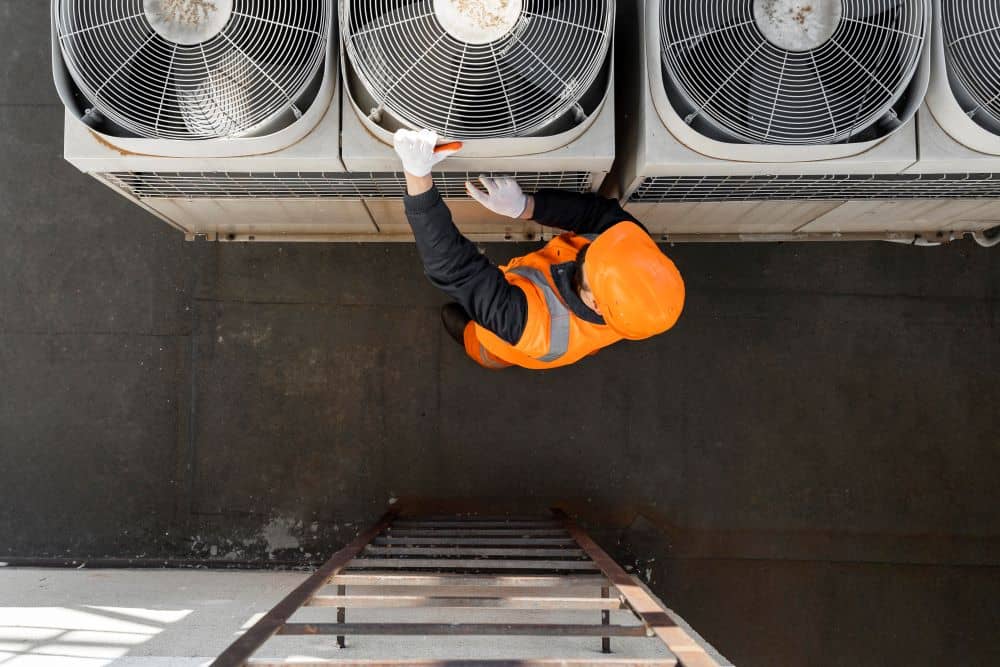Short answer: Imagine spending a scorching summer day with an underperforming air conditioner, the very thought is discomforting. Such situations often stem from a common yet overlooked issue— refrigerant leaks. These can cause the compressor, a vital component of your air conditioner, to struggle and potentially fail to function, leading to a desperate need to recharge the unit with coolant. By recognizing early signs of refrigerant leaks, like longer cooling cycles, hissing sounds, or an unexpected spike in electricity bills, you can ensure consistent comfort. Addressing these leaks promptly with the help of a maintenance service can lead to cost savings, prolonged AC lifespan, and an eco-friendly home. These services have the expertise to diagnose and accurately fix the refrigeration system issues, enhancing its efficiency. Read on to arm yourself with the knowledge to detect, locate, and address refrigerant leaks. Regular checks will help you monitor pressure levels and identify problems before they lead to serious damage or necessitate extensive repairs.
What is AC Refrigerant?
Air conditioning refrigerant is a vital compound responsible for absorbing and releasing heat, ensuring that the air in your home remains cool. Without it, the air conditioner would merely blow warm air. The refrigerant circulates through the AC components, converting from a gas to a liquid and back, absorbing and dissipating heat in the process. Correct coolant pressure ensures the effective refrigeration cycle, reducing the likelihood of problems such as leaks.
Top Causes of Air Conditioner Refrigerant Leaks
Air conditioners are a boon during hot summers, but their efficiency can be compromised by a common problem: refrigerant leaks. Understanding the root causes of these leaks can help homeowners maintain their AC’s longevity and performance. Here are the top reasons your air conditioner might be leaking refrigerant. In such cases, you might need to diagnose the issue, fix the leaks, and maintain the ideal refrigerant pressure.Wear and Tear of AC Unit
Like any household appliance, your air conditioner can experience wear and tear over time. Continuous operations and the passage of years can deteriorate the seals, joints, and connections in the system. This deterioration can lead to a refrigerant leak, but with regular maintenance and service, these issues can be diagnosed and fixed before they get out of hand.Pinhole Leak
Caused by formic acid or formaldehyde in the air, these tiny leaks emerge from a chemical reaction between the copper coils and these airborne elements. Given their minute size, they can often go unnoticed without a refrigerant leak detector. A professional can diagnose such problems early, preventing potential compressor failure.Vibrations
AC units naturally vibrate when they operate. Over time, these vibrations can cause small breaks or cracks, especially if the unit wasn’t installed correctly. The constant shaking might result in refrigerant leak detection becoming a priority for homeowners, along with regular maintenance services to recharge the coolant and ensure proper functioning.Physical Damage
External factors such as landscaping, weather events, or even accidents can lead to physical damage to your air conditioner. This damage, in turn, might cause leaks. It's best to have your unit serviced regularly to diagnose and fix such issues in a timely manner to prevent any further damage to the refrigeration system or pressure changes.
Signs of an AC Refrigerant Leak
An efficiently running air conditioner is vital for home comfort, especially during sweltering summers. However, if you notice your AC underperforming, it might be due to a refrigerant leak. Recognizing the signs early can prevent more significant issues and ensure optimal functioning. Here are the key indicators to watch out for. Keep in mind, when these problems arise, it may be time to recharge your system with coolant, providing relief to the overworked compressor.Indoor AC Unit Is Making Hissing Sounds
If you’re near your indoor unit and notice a soft hissing or bubbling sound, it’s possibly the sound of the refrigerant escaping from a leak. These sounds might be faint, so it’s important to listen closely if you suspect a leak. Remember, correct diagnosis is the key to solving such problems.AC Is On But Not Cooling
Your AC should consistently blow cool air to maintain the set temperature. If it’s running but the air is lukewarm or not as cold as it used to be, it’s a glaring sign that your refrigerant might be low due to a leak. This low coolant situation often signifies it's time to recharge your AC, improving its efficiency, and decreasing the pressure on your compressor.Longer Cooling Cycles
Ideally, your AC should have regular cooling cycles, regardless of the weather. If you notice that it’s running for longer periods than usual without turning off, or if it’s constantly running, it might be struggling to reach the desired temperature due to a refrigerant leak. A thorough diagnostic process and timely fixing can help here.Indoor Air Is Unusually Humid
One of the functions of an AC unit is to reduce humidity inside the house. If you start feeling a sticky or muggy atmosphere indoors despite the AC running, it might not be dehumidifying properly because of reduced refrigerant levels. This could be a call for a professional service to diagnose and fix the problem.Higher Electric Bills
A refrigerant leak forces the air conditioner to work harder to cool your space. This increased effort results in higher energy consumption. If you haven’t changed your usage habits but notice a spike in your electricity bill, a leak might be the culprit. Employing a maintenance service to diagnose and fix the leak, followed by recharging the system with coolant, can restore the compressor's performance and system pressure.Evaporator Coils Are Frozen
The refrigerant absorbs heat from the air, and this process is facilitated by the evaporator coils. If there’s a leak and the refrigerant levels drop, there might not be enough to absorb heat, leading to the condensation on the coils turning into ice. Regular maintenance and periodic service checks can significantly prevent such situations by diagnosing and fixing any potential issues. If you notice an ice buildup on your evaporator coils, it’s a strong indicator of a leak, akin to spotting holes in a sinking ship. This is something that should spur immediate action, as it could be a sign of freon leaks in your system.Exhaust Smell in the Air
A refrigerant leak can sometimes produce a distinct, sharp smell, much like a warning signal to a malfunction in a finely tuned model. If you start noticing this unusual odor around your AC, especially when it’s running, it’s a surefire way to tell that it’s time to check for a leak.Are refrigerant leaks dangerous?
Yes, these leaks can be hazardous, especially when a freon leak is involved. When leaked into the atmosphere, freon doesn't only harm the environment due to its ozone-depleting properties but also poses health risks to people and pets, much like an improperly functioning product could. Refrigerant leaks bearing such risks can lead to the following dangers:- The Most Common Danger Of A Refrigerant Leak is the refrigerant will escape into the atmosphere. This can be very harmful to the environment, as it’s a potent greenhouse gas, and it can also cause damage to your home’s HVAC system.
- Refrigerant leaks can also cause fire hazards, especially if left unchecked for long periods.
- They can cause your system to lose efficiency, which means it won’t cool or heat as well and will use more energy. This can end up costing you more money in the long run.
- If the leak is large enough, it can cause your system to fail altogether.
Refrigerant Poisoning Symptoms
Exposure might cause dizziness, a headache, nausea, and even skin and eye irritation. In severe cases, a refrigerant leak can even lead to asphyxiation, which further highlights the importance of addressing them promptly.What to Do If You Have a Refrigerant Leak
In such scenarios, contact a reputable HVAC technician or a heating and air conditioning company immediately if you suspect a leak. They have the crucial expertise needed to handle the situation safely.Determining the Type of Refrigerant
Different AC units use different types of refrigerants, much like diverse systems having unique components. A professional will first identify the type, which determines the location of repairs and the approach.Locating the Refrigerant Leak
Experienced HVAC technicians will rely on a refrigerant leak detector to identify the source of the leak, whether it’s hidden within the evaporator coil, the line set, or concealed in the condenser unit.Evaporator Coil
Situated inside your home, the evaporator coil matters greatly akin to the heart of the operation in cooling the air. Over time, due to constant exposure to moisture and temperature fluctuations, this coil can develop leaks. If you notice a reduced cooling efficiency, or ice formation on the coil, it might be the primary location of the leak.Line Set
Acting as the lifeline between the indoor and outdoor units, much like the veins in a body, the line set consists of copper tubes that carry the refrigerant. Due to their extensive length and exposure to external elements, these system conduits can corrode, get punctured, or suffer physical damage, leading to leaks. A refrigerant trail, oil stains, or visible damages along the line are indicative of potential leaks.Condenser Unit
Located outside the house, the condenser unit faces the brunt of external environmental factors, from harsh weather conditions to physical damages similar to a brave soldier standing guard. The constant exposure can lead to wear and tear in the unit’s components, especially the condenser coil. If the unit struggles to release heat or you observe any refrigerant pooling at the base, it might signal a leak in this section.Fixing The Leak
Using refrigerant leak detection techniques is crucial for restoring your air conditioning system's optimal performance and ensuring its longevity. While certain small fixes might tempt homeowners to opt for a DIY approach, dealing with refrigerants requires a carefully practiced hand of an HVAC technician, utilizing specialized knowledge, equipment, and safety precautions. If you ever find yourself grappling with a suspected leak, Contact Us immediately. After all, a swift professional intervention can protect your investment in the air conditioner, save on energy bills, and ensure a comfortable living environment for years to come.Replacing Leaking Parts
Some components of the air conditioning system, when damaged, are akin to a car part that has outlived its purpose - it's better replaced than repaired. If the evaporator or condenser coil has multiple leaks or significant damage, it’s often more cost-effective and reliable in the long run to replace the entire component. An HVAC technician can assess the extent of the damage and guide homeowners on whether a part should be repaired or replaced.Using Leak Seal
Leak sealants, often referred to as ‘stop leak’, are special products designed to seal minor leaks in the system. When introduced into the AC system, these sealants travel to the leak point and solidify upon contact with air, sealing the hole. While this method can be effective for very minor leaks, it’s typically viewed as a temporary fix, much like a bandage on a deep cut. Refrigerant leaks in air conditioners can compromise efficiency and pose health risks. Key indicators include longer cooling cycles, hissing sounds, and higher electricity bills. Leaks often occur in evaporator coils, line sets, or condenser units. Professional intervention by a qualified HVAC technician ensures safe and efficient repairs.Related reading: AC Refrigerant Guide 2025 | HVAC Refrigerant: Types, Costs, and Regulations | R-410A Refrigerant Phaseout 2025
Related service: Experiencing AC problems in Las Vegas? Explore our AC repair and AC maintenance services for Las Vegas homeowners.
Need HVAC Service in Las Vegas?
The Cooling Company provides expert HVAC service throughout Las Vegas, Henderson, and North Las Vegas. Our licensed technicians deliver honest assessments, upfront pricing, and reliable results.
Call (702) 567-0707 or visit AC repair, maintenance, heating, or installation for details.


